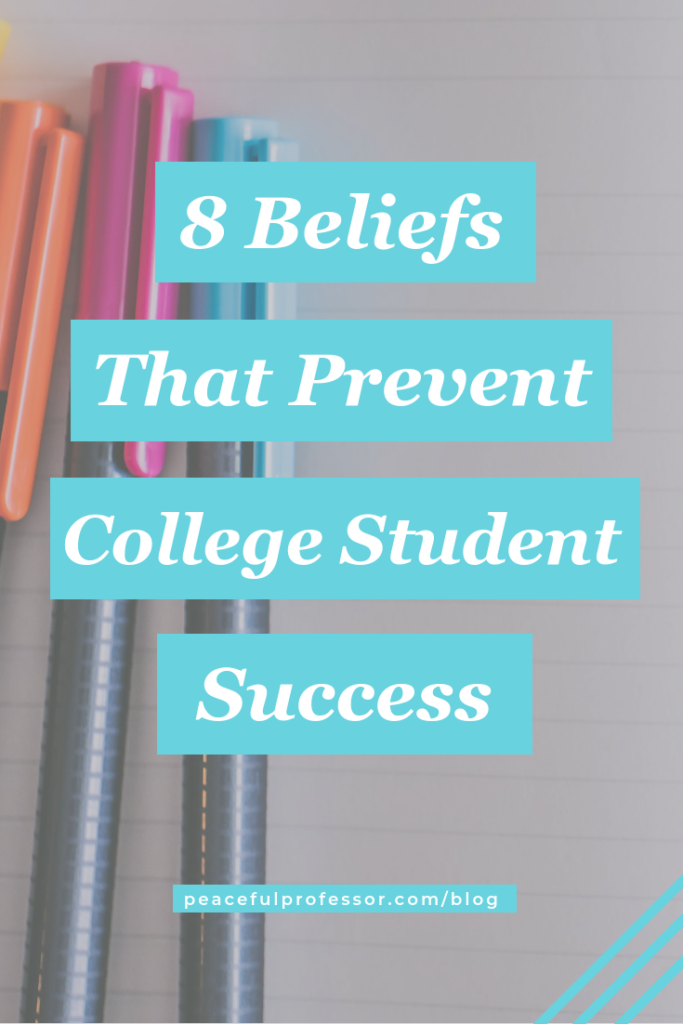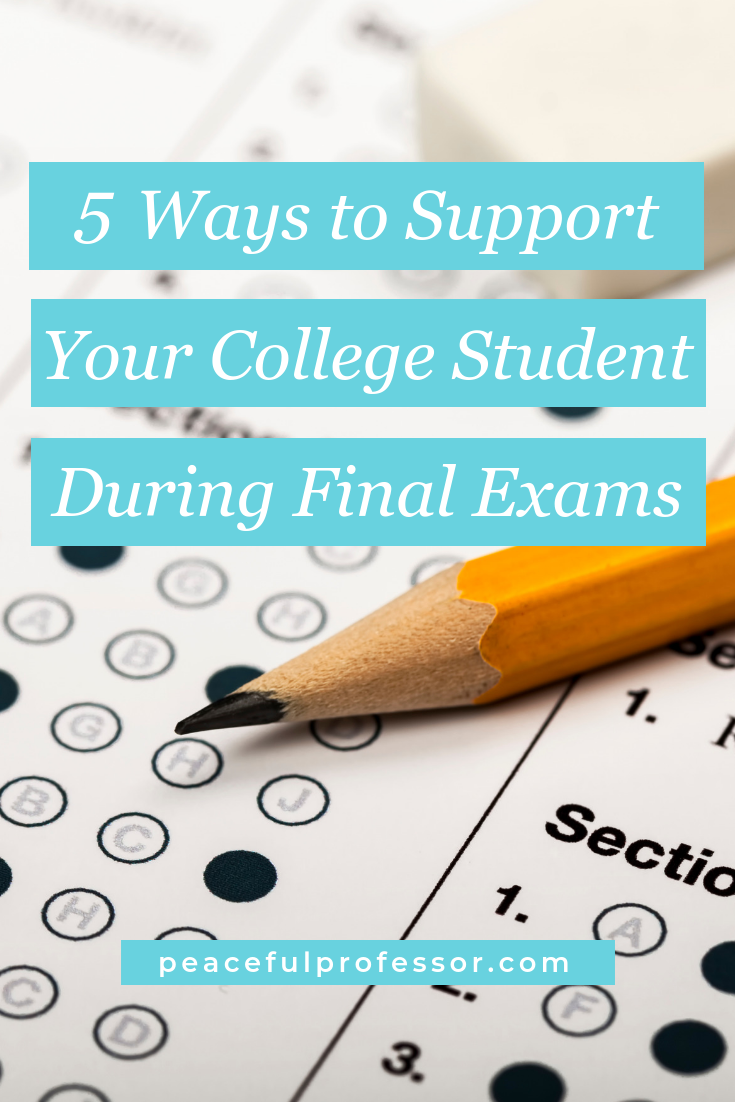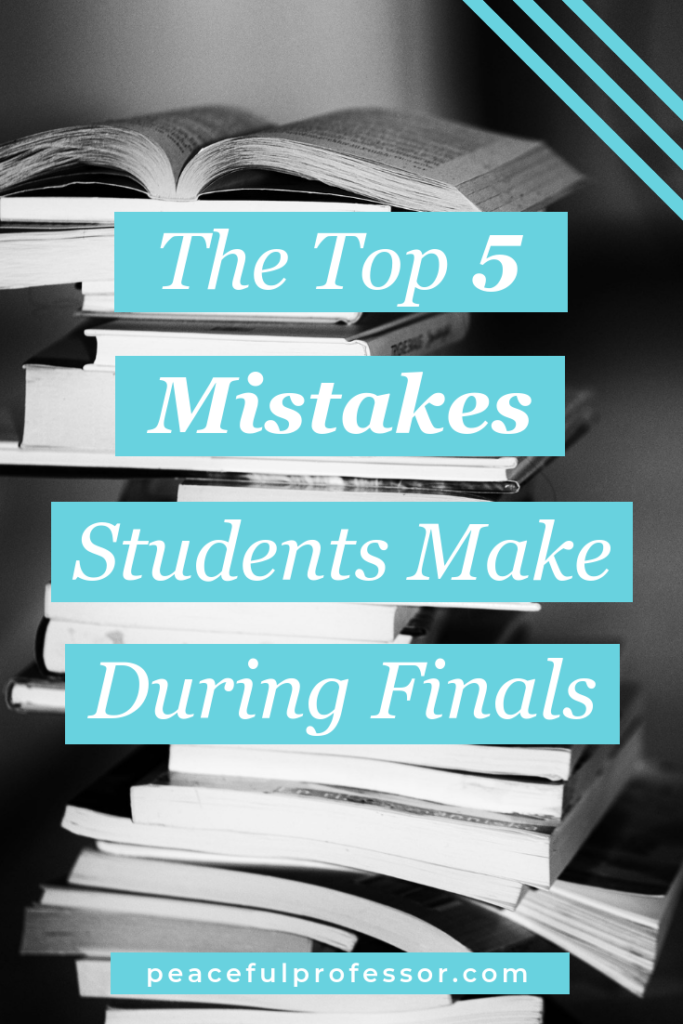8 Beliefs That Prevent College Student Success
Are you a college student caught in the middle of a quarter-life crisis, wondering what the heck you’re doing with your life? Or perhaps you’re the parent of such a student and you’re worried about their future. If so, you’ll really benefit from my conversation with Katy Oliveira from the Collegehood Advice blog and podcast. Katy and I bust commonly believed myths about college majors, career paths, and motivation that get in the way of student success.
Myth #1: There’s a Formula for Success
Jessica: As a coach, you help students figure out who they want to be and what they want to contribute to the world. In this process, students often have to make some mindset shifts. What flawed premises or misconceptions do a lot of young people (and their parents) have about college, work, and identity?
Katy: I’m a historian so bear with me. Many of the ideas we have about college and the purpose of work comes from a 20th century economic model. In that model, a very small percentage of elite people would go to college and the purpose of college was to prepare them to be leaders in government, business, and in our society. All they had to do was go to a good college, choose a profession like attorney, doctor, teacher, leader, and they would get that degree and then they would go become that thing for the rest of their life. Their profession would be their identity and who they were for the rest of their life.
That model is starting to not fit our 21st century society anymore. So one of the flawed premises is this idea that I can follow a process or a formula: Do well in high school. Check! Pick the right prestigious college. Check! Pick the right major. Check! Get a good GPA. Check! And then I’m going to pop out of the college factory into a successful, easy life. That’s not how it works anymore. Yes, you can still become a doctor, a teacher, a lawyer. But even those professions are changing and are quite challenging in a lot of different ways.

Myth #2: You’ll Have One Career
The other flawed premise is that your profession is who you’re going to be. If you shift from that, then you fail in some way. But the reality is that most people change their career at least five times, even sometimes seven times, over the course of their life. That’s not like they change their job. I mean they change their career. Like me, for example, I went from being a legal assistant to an advisor to an administrator to an online entrepreneur. I’ve already changed my career four times and I’m not 40 yet! So there’s a lot of potential to do that in your life, too. You’re going to need to pivot and you’re going to need to be you, unabashedly you. And you’re going to have to know who you are and what you bring to the table and be able to use that to adapt.
So I think that’s the other flawed premise — that we are going to become one thing, and we need to be able to just know what that thing is. Well, that thinking is problematic because you’re limited. You only know what you’ve seen your parents and people in your community do for work. And there’s a lot more work out there than people who are immediately next to you. And you only know what’s on TV and I hate to break it to you, but most of what’s on TV is not an accurate depiction of that work. And we think that success is like this big, grand, sexy, rich, internet-famous kind of thing and most success doesn’t look like that. Success is actually quite beautiful and simple and accessible to most of us, but we perceive it to be something else because we have these curated, mediated ideas that corrupt reality and create misconceptions of what successful life really looks like.
Myth #3: Loved Ones Always Know What’s Best for You
I think this misconception comes out of the reaction people have to what you’re doing. So in my own life when I told people “I’m going to major in history,” the reaction I got was “what are you going to do with that?” Teach?” And so that reaction was giving me feedback that I picked a “bad” major and that the thing I wanted to do with it, which was teaching, was not great. That feedback, that perception from other people, really can shape us and a lot of us will make our decisions looking for approval from those around us. They are well-meaning. They want us to be successful. But they don’t always know what your options are, and they also don’t always know what’s best for you. And so I think the idea that you have to pick something that others approve of is also limiting because often what seems practical and safe for people is simply a reflection of what they know.
I think students often know what they want to do with their life. When I talk with students, our conversation will go something like this: “what do you want to do with your life?” And they’ll say, “What I really want to do or what I’m doing?” And I think, “why are those different?” And they’ll say, “Oh, because what I really dream of doing isn’t practical.” And then they’ll tell me something really scandalous and fantastical like, “I want to open a brewery.” And I’m like, “Wait a second. That’s totally in reach. Have you ever brewed beer? Have you ever worked part time at a brewery? Have you ever talked to anybody who works at a brewery? No? Okay, let’s start there.” So I think we often limit ourselves and think our dreams aren’t real because somebody has shut us down.
Myth #4: “Pursue Your Passion” is Good Advice
Jessica: That segues nicely into my next question about misconceptions and people’s well-meaning advice. I think a lot of times we tell students to “pursue their passion” or “do what they love” and think that is helpful, inspirational advice. What’s your opinion about that type or that line of advice that we frequently offer to students?
Katy: It’s another one of these well-meaning things that people are saying from a place of love that I think can be destructive. For some of us, having a passion is a valid way of starting the conversation or starting our thinking about what we want to do with our lives, but I agree with the author Elizabeth Gilbert. She wrote Eat Pray Love and Big Magic if you’re not familiar with her work. She used to give the advice of following your passion, but she’s a reformed “passion following adviser” [laughs]. She now encourages you to own your curiosity, and I think there’s a lot of power in that. Curiosity is more chill. Passion is too intense. Some people don’t feel passion while other people feel a lot of passion. And for some people, the passion sort of burns out after something new becomes comfortable.
I also think passion only takes you so far. I really believe that you must have experiences in the world to refine and shape what you do in your life. The only way to know if something that looks really awesome on paper is good for you is to do it. In my own story, on paper, I could do some biology! I could take tests. I could read. I could even watch a surgery and be okay. But when I had to take that scalpel and cut that frog, I passed out because I could not actually do the experience. I didn’t know that until I had the experience of trying to do it myself. In theory, I had everything it took to do it. In practice, I didn’t.
So I think you need experiences. I think a lot of people are afraid to put themselves out there and take the risks because it takes time, it takes work, and it takes being vulnerable. But that’s really how we are going to grow and excel. And so I think that passion may not be that first step. Instead, curiosity might be the first step.
Jessica: That’s really wise advice. I think curiosity is very powerful and it can tell us a lot about ourselves, perhaps more so or in a different way than passion. I think students can connect better to questions like what are you curious about? What gets you excited? What do you want to make? What do you want to fix?

Myth #5: College Major = A Job
Jessica: So, related to determining what you’re curious about and what you want to contribute to the world, I want to talk about majors. Families place a lot of emphasis on what academic major their student is going to pursue in college. What are your thoughts about the pressure we put on deciding which major to choose?
Katy: I think a major is important for different reasons than most people think. Most people perceive that a major equals a job. Majors don’t equal jobs. Majors equal multiple jobs and multiple career opportunities, unless you’re in the handful of old professions that require a linear path. So there are professions on that linear path — nurse, engineer, teacher, accountant — where your major does equal a job, but that’s a small percentage. Most of the other majors and most of the other jobs available aren’t part of that paradigm or framework.
A major is just one component of your overall degree, and in some cases it doesn’t even make up 50% of the degree that you’re getting. A bachelor’s degree includes all your general education requirements, any electives that you take, plus your major courses which make up maybe a third of that degree. Plus, all of the leadership, research opportunities, mentoring, service, study abroad, all of those other experiences that are going to actually prepare you and give you concrete skills and connections.
But we have boiled down the college experience to like 40 hours, which I think is a real shame. Students leave 75% of the college experience on the table because they’re so focused on a major and GPA and not spending their time on creating meaningful projects and getting internships that are actually relevant to them. They’re putting empty things on their resume instead of really robust things that will prepare them that are intentional and strategic.
So that being said, your major should be something that you find fascinating, that you can excel in, that’s going to build transferable skills, and that’s going to connect you with the people who you want to work with. Don’t think of it as a box to tick or a transaction to get out of the way. Think of how it’s going to be a launching pad for more meaningful and intentional opportunity down the road.
Myth #6: Lack of Motivation is Just Laziness
Jessica: In episode 63 of your Collegehood Advice Podcast, you discussed how a student’s lack of motivation and productivity might actually be connected to their current major. Could you talk about that connection between motivation and major?
Katy: Absolutely. The normal line of thinking is that failure in the academic realm is a result of poor habits and skills, such as study strategies, time management, and decision making, and that all we need to do is beef up our executive functioning skills in order to improve. But a lot of times, academic struggles have to do with what you’re studying, what your major is, and what you want to do with your life. If your major is just a transaction and it doesn’t make sense or have meaning to you, it can be really hard to adopt those strategies and feel motivated.
I’ve seen this happen over and over with my own students and this happened in my own story. I was pre-med and I was a D/C student. I struggled. I should have gone to tutoring more, I should have studied more, but I didn’t do it because I wasn’t that motivated. I didn’t go to tutoring. I didn’t follow through on the time management stuff I learned. Any time I sat down to study biology, I felt distracted. I felt dread. It wasn’t that I didn’t have the skills, it was that I didn’t like what I was doing.
When I changed my major, that transformed. I got my homework done before I went out. I would look forward to reading. I’d be excited to write a paper. My GPA went from like a 2.9 to a 3.8 and a 4.0 in my major, because I was in my thing. That’s what I mean when I say majors connect to motivation. I can teach you time management stuff and grown-ups have been doing that to you since the eighth grade when you first said, “I think I want to go to college.” But you’re not doing it, not because you are lazy but because you’re not motivated. And you’re not motivated because you’re not in connection with your “why” or what you want to do with your life. The moment you become in connection with that, all the other pieces fall into place.
I see students all the time struggling and feeling lazy because they’re not motivated. They feel like something’s wrong with them because they’re not motivated. They’re not doing the things they know they need to do and almost every time, a misalignment with their purpose and what fuels them is to blame. You are so much more willing to get the help and support and skills that you need when you’re in alignment with your “why.”
Jessica: That makes complete sense. When I was teaching, I saw that a lot. That disconnection between what inspires them or makes them curious or makes them feel motivated and energized versus what they were actually doing in the present. It can lead to a lot of stress and mental health struggles because you’re not doing what you want to do.

Myth #7: You Must Major in Something Traditional to Be Successful
Jessica: What advice would you give parents whose child announces they they are going to switch their major, especially to a major they don’t know a lot about or don’t approve of.
Katy: Some of the degrees that have been old faithfuls are changing. You don’t make as much money as you used to in many of these professions. There are a lot of jobs that we think of as a society as status quo, successful, stable jobs — accounting and law being two of the ones that come to mind — that are changing rapidly, because of things like technology and saturation in the market.
So I think parents need to have an open mind about the creative work force, which is what we’re shifting to, and rethink the perception of, “an artist or a writer can’t make a living.” Those are actually perfectly valued degrees now in a world of graphic design and website copy and beautiful Instagram feeds. Writers can make a lot of money; graphic designers can make a lot of money. So I wouldn’t poo-poo a degree you’re not familiar with because it may be more successful than you realize.
One of my little quips of advice is “it’s not what you major in, it’s what you do with it.” I have a friend who has an undergraduate degree in sociology and a graduate degree in anthropology, and she does marketing for a living. She works at a marketing firm and they hired her because she’s a sociologist and anthropologist so she understands humans and their behaviors. She’s a really important person to have on the team because of her particular skill set.
As another example, I had a student who really wanted to major in art but her parents wouldn’t let her. She was drowning, unhappy, truly depressed, and not doing well in her classes. She was not making friends, feeling very lonely, and would talk to me multiple times a week instead of hanging out with other people. Finally, she became convinced that she needed to change to art even though her parents weren’t supportive of that. And when she did, her GPA improved, her happiness improved, her anxiety diminished. She started an art club on campus that she’s super involved in. It’s like a different kid. She found her place. And it’s because she connected to what she was meant to do.
If your student’s major doesn’t equal a traditional job, don’t think that means the college degree is worthless. Many people believe that your degree is your major, but the major is only a tiny component of college. So move the focus away from the major and toward the other things that the college experience provides such as the development of skills like creativity, problem solving, pivotability or flexibility, and collaboration, which are highly valued by employers.
Myth #8: You Should Care What Others Think of You
Jessica: My final question is if you could go back in time and talk to yourself as a freshman in college, what advice would you give to her?
Katy: Oh man, I would tell her “Please, please, stop being so concerned about what everybody thinks of you. Being cool, getting approval from people is such a waste of your time. Conformity is sort of the way to win in high school, but in college and adult life, being 100% who you are is how you succeed, and the earlier you learn that, the fewer headaches you’re going to bump into. Now, don’t become a jerk. Be compassionate and considerate of the needs of others. But you worry about you and worry about what your needs are, because I just ran myself into the ground because of FOMO [fear of missing out] and spent a lot of time and energy on that. I would also tell her to continue to watch a lot of Food Network. It’s really going to help you in the long run to become a great cook!
Did you enjoy my conversation with Katy? If so, check out her podcast, Collegehood Advice, to help you thrive during college! Find it on Spotify, iTunes, and anywhere you access your podcasts. And be sure to check out my episode all about no-nonsense self-care.
Want more college advice? Read my interview with Sara Pennington from Segue to College in which she reveals the very best tips and tricks for smoothly transitioning into college life.



